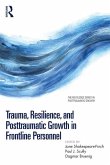Human Factors and Ergonomics of Prehospital Emergency Care
Herausgeber: Lazzara, Elizabeth H.; Misasi, Paul; Keebler, Joseph R.
Schade – dieser Artikel ist leider ausverkauft. Sobald wir wissen, ob und wann der Artikel wieder verfügbar ist, informieren wir Sie an dieser Stelle.
Human Factors and Ergonomics of Prehospital Emergency Care
Herausgeber: Lazzara, Elizabeth H.; Misasi, Paul; Keebler, Joseph R.
- Gebundenes Buch
- Merkliste
- Auf die Merkliste
- Bewerten Bewerten
- Teilen
- Produkt teilen
- Produkterinnerung
- Produkterinnerung
This book provides practical information for individuals who are involved in pre-hospital emergency care-from EMS practitioners to organizational leaders and research scientists. Relevant theories of human factors, including systems engineering principles, teamwork, training, and interfaced design are reviewed in light of the needs of current day pre-hospital emergency care. The primary focus is to expand awareness of current issues and their solutions to increase safety for patients and pre-hospital practitioners.
Andere Kunden interessierten sich auch für
![Designing for Situation Awareness Designing for Situation Awareness]() Mica R. Endsley (SA Technologies, Marietta, Georgia, USA)Designing for Situation Awareness110,99 €
Mica R. Endsley (SA Technologies, Marietta, Georgia, USA)Designing for Situation Awareness110,99 €![Human Factors Methods Human Factors Methods]() Neville A. StantonHuman Factors Methods78,99 €
Neville A. StantonHuman Factors Methods78,99 €![Human Factors Impacts in Air Traffic Management Human Factors Impacts in Air Traffic Management]() Mark RodgersHuman Factors Impacts in Air Traffic Management81,99 €
Mark RodgersHuman Factors Impacts in Air Traffic Management81,99 €![Managing Maintenance Error Managing Maintenance Error]() James ReasonManaging Maintenance Error73,99 €
James ReasonManaging Maintenance Error73,99 €![Human Factors in Land Use Planning and Urban Design Human Factors in Land Use Planning and Urban Design]() Nicholas J. StevensHuman Factors in Land Use Planning and Urban Design53,99 €
Nicholas J. StevensHuman Factors in Land Use Planning and Urban Design53,99 €![Critical Perspectives on the Management and Organization of Emergency Services Critical Perspectives on the Management and Organization of Emergency Services]() Paresh WankhadeCritical Perspectives on the Management and Organization of Emergency Services64,99 €
Paresh WankhadeCritical Perspectives on the Management and Organization of Emergency Services64,99 €![Trauma, Resilience, and Posttraumatic Growth in Frontline Personnel Trauma, Resilience, and Posttraumatic Growth in Frontline Personnel]() Trauma, Resilience, and Posttraumatic Growth in Frontline Personnel47,99 €
Trauma, Resilience, and Posttraumatic Growth in Frontline Personnel47,99 €-
-
-
This book provides practical information for individuals who are involved in pre-hospital emergency care-from EMS practitioners to organizational leaders and research scientists. Relevant theories of human factors, including systems engineering principles, teamwork, training, and interfaced design are reviewed in light of the needs of current day pre-hospital emergency care. The primary focus is to expand awareness of current issues and their solutions to increase safety for patients and pre-hospital practitioners.
Produktdetails
- Produktdetails
- Verlag: Taylor & Francis Inc
- Seitenzahl: 238
- Erscheinungstermin: 24. März 2017
- Englisch
- Abmessung: 163mm x 240mm x 19mm
- Gewicht: 526g
- ISBN-13: 9781482242515
- ISBN-10: 1482242516
- Artikelnr.: 47964108
- Herstellerkennzeichnung
- Libri GmbH
- Europaallee 1
- 36244 Bad Hersfeld
- 06621 890
- Verlag: Taylor & Francis Inc
- Seitenzahl: 238
- Erscheinungstermin: 24. März 2017
- Englisch
- Abmessung: 163mm x 240mm x 19mm
- Gewicht: 526g
- ISBN-13: 9781482242515
- ISBN-10: 1482242516
- Artikelnr.: 47964108
- Herstellerkennzeichnung
- Libri GmbH
- Europaallee 1
- 36244 Bad Hersfeld
- 06621 890
Joseph R. Keebler, PhD has over 10 years of experience conducting experimental and applied research in human factors, with a specific focus on training and teamwork in military, medical, and consumer domains. Joe currently serves as an assistant professor of human factors and systems at Embry Riddle Aeronautical University. Joe has led projects aimed at the implementation of human factors in complex, high-risk systems, to increase safety and human performance. This work includes command and control of tele-operated unmanned vehicles, communication and teamwork in medical systems, and development of simulation and gamification of training for advanced skills including playing the guitar and identifying combat vehicles. Joe's work includes over 50 publications and over 60 presentations at national and international conferences. Prior to being an Assistant Professor at Embry-Riddle Aeronautical University, Elizabeth Lazzara received her doctorate in Applied Experimental Human Factors Psychology from the University of Central Florida where she also conducted research at the Institute for Simulation and Training in Orlando, Florida. Although she has had extensive experiences in military, academic, and commercial settings, Dr. Lazzara's primary interests lie within improving the quality of patient care within the healthcare domain. She strives to make a long lasting and significant impact by examining and advancing the science and practice of clinical care and patient safety issues pertaining to human performance, teamwork, team training, and simulation-based training, and performance measurement. Paul Misasi has been a paramedic for thirteen years and currently serves as the Clinical Manager for Sedgwick County EMS (Kansas). He holds a Master of Science degree in Emergency Health Services from the University of Maryland, Baltimore County, a Master of Arts in Psychology and Bachelor of Science in Health Service Organization & Policy, both from Wichita State University. He is the first paramedic/ ambulance service manager to achieve board certification in patient safety through the National Patient Safety Foundation. Prior to becoming a paramedic, Mr. Misasi began his study in human factors through his flight training and pilot licensure at Oklahoma State University, and is now a third-year doctoral student in human factors psychology at Wichita State University. He is principal developer of the industry-wide "best practice" of the Medication Administration Cross-Check(c) protocol, which is under peer-review as the first empirically validated medication verification process.
List of figures
List of Tables
Notes on contributors
Foreword
1. Introduction to Human Factors and Ergonomics of EMS
2. Cognitive Factors in Emergency Medical Services
3. Situation Awareness, Sociotechnical Systems, and Automation in Emergency
Medical Services: Theory and Measurement
4. Naturalistic Decision Making in Emergency Medical Services
5. Stress and Performance in EMS
6. Expertise and Decision Making in EMS
7. Teams and Teamwork in Emergency Medical Services
8. Defining the Pre-Hospital Care Multiteam System
9. Cognitive Aids in Emergency Medical Services
10. Exploring Telemedicine in Emergency Medical Services: Guidance in
Implementation for Practitioners
11. Communication and Patient Care Handover: Prehospital Emergency
Preparation
12. Changes From Within: How Paramedic Services can Lead the Way Human
Factors is Implemented in Healthcare
13. Disaster and Response in Emergency Medical Systems (EMS): Team Training
to the Rescue
14. Resilience Engineering in Prehospital EMS
15. EMS Occupational Safety Issues, Implications, and Remedies
Index
List of Tables
Notes on contributors
Foreword
1. Introduction to Human Factors and Ergonomics of EMS
2. Cognitive Factors in Emergency Medical Services
3. Situation Awareness, Sociotechnical Systems, and Automation in Emergency
Medical Services: Theory and Measurement
4. Naturalistic Decision Making in Emergency Medical Services
5. Stress and Performance in EMS
6. Expertise and Decision Making in EMS
7. Teams and Teamwork in Emergency Medical Services
8. Defining the Pre-Hospital Care Multiteam System
9. Cognitive Aids in Emergency Medical Services
10. Exploring Telemedicine in Emergency Medical Services: Guidance in
Implementation for Practitioners
11. Communication and Patient Care Handover: Prehospital Emergency
Preparation
12. Changes From Within: How Paramedic Services can Lead the Way Human
Factors is Implemented in Healthcare
13. Disaster and Response in Emergency Medical Systems (EMS): Team Training
to the Rescue
14. Resilience Engineering in Prehospital EMS
15. EMS Occupational Safety Issues, Implications, and Remedies
Index
List of figures
List of Tables
Notes on contributors
Foreword
1. Introduction to Human Factors and Ergonomics of EMS
2. Cognitive Factors in Emergency Medical Services
3. Situation Awareness, Sociotechnical Systems, and Automation in Emergency
Medical Services: Theory and Measurement
4. Naturalistic Decision Making in Emergency Medical Services
5. Stress and Performance in EMS
6. Expertise and Decision Making in EMS
7. Teams and Teamwork in Emergency Medical Services
8. Defining the Pre-Hospital Care Multiteam System
9. Cognitive Aids in Emergency Medical Services
10. Exploring Telemedicine in Emergency Medical Services: Guidance in
Implementation for Practitioners
11. Communication and Patient Care Handover: Prehospital Emergency
Preparation
12. Changes From Within: How Paramedic Services can Lead the Way Human
Factors is Implemented in Healthcare
13. Disaster and Response in Emergency Medical Systems (EMS): Team Training
to the Rescue
14. Resilience Engineering in Prehospital EMS
15. EMS Occupational Safety Issues, Implications, and Remedies
Index
List of Tables
Notes on contributors
Foreword
1. Introduction to Human Factors and Ergonomics of EMS
2. Cognitive Factors in Emergency Medical Services
3. Situation Awareness, Sociotechnical Systems, and Automation in Emergency
Medical Services: Theory and Measurement
4. Naturalistic Decision Making in Emergency Medical Services
5. Stress and Performance in EMS
6. Expertise and Decision Making in EMS
7. Teams and Teamwork in Emergency Medical Services
8. Defining the Pre-Hospital Care Multiteam System
9. Cognitive Aids in Emergency Medical Services
10. Exploring Telemedicine in Emergency Medical Services: Guidance in
Implementation for Practitioners
11. Communication and Patient Care Handover: Prehospital Emergency
Preparation
12. Changes From Within: How Paramedic Services can Lead the Way Human
Factors is Implemented in Healthcare
13. Disaster and Response in Emergency Medical Systems (EMS): Team Training
to the Rescue
14. Resilience Engineering in Prehospital EMS
15. EMS Occupational Safety Issues, Implications, and Remedies
Index








